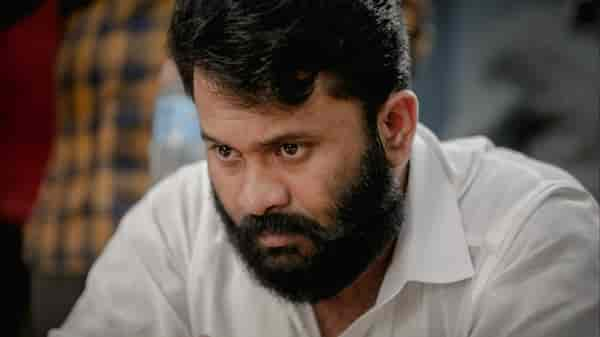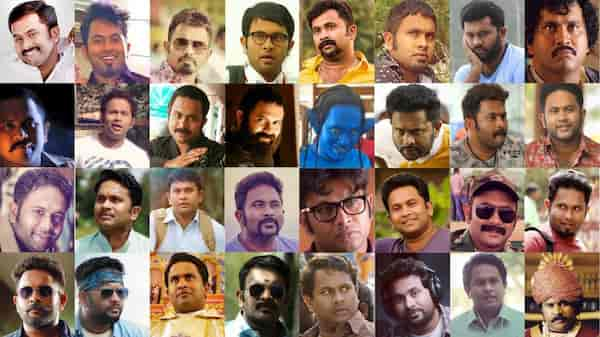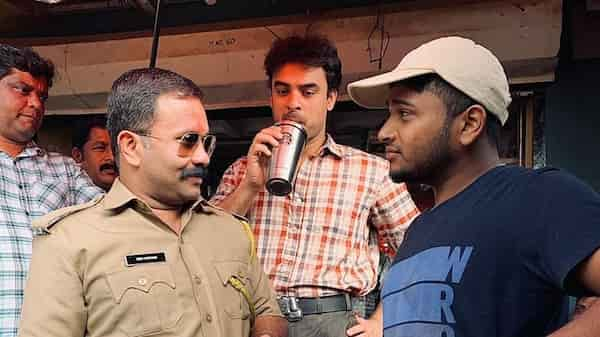Exclusive! Aju Varghese: I have decided that I will read the entire script before choosing a role now
Mollywood’s prolific supporting actor talks about the changes he wants to make in his career, the kind of films that he wants to be part of and more

Last Updated: 10.09 AM, Jan 20, 2022
In more ways than one, Vineeth Sreenivasan’s Hridayam is special to Aju Varghese too. The movie gave the actor another chance to collaborate with his mentor, albeit with the same anxiety, he admits, he had while making his debut in the filmmaker’s Malarvadi Arts Club in 2010. But it’s that quality, to never take his role in a movie for granted, that has made him one of the most prolific supporting actors in the past decade.
A look at Aju’s recent filmography that includes Helen, Saajan Bakery, which he had also co-wrote, Minnal Murali and Meppadiyan also reveal that the actor has been trying to experiment with characters with different shades. In a candid chat with OTTplay, the actor, who has completed over 110 films, talks about his new strategy in picking roles, movies that he wants to be part of and more.
You made your debut in the industry almost 12 years ago with Malarvadi Arts Club. Today, you are an actor, a producer and a distributor with a presence not just in films but in TV and digital platforms. How essential is it for an actor to now venture into these arenas?
This is not something that I did envisioning that it was essential. If you look at Funtastic Film’s YouTube channel, the reason for its content was the pandemic lockdown. That was also when I acted in a TV serial (Kudumbavillakku). In 2020, we were given permission to conclude whatever movies we had pending in June. Until then I had no work. My job is to act and so, I didn’t give any importance to the medium. Be it YouTube or TV, I thought it was the time to experiment and so all of this happened coincidentally.
Your upcoming release, Hridayam, has you working with Vineeth Sreenivasan again with whom you had begun your career. How was the experience?
After Thattathin Marayathu in 2012, I was acting under his direction next for Hridayam. I had worked as an assistant director in Jacobinte Swargarajyam. Though I had shared screen space with him in many films such as Oru Vadakkan Selfie, I was extremely conscious while working with him in this movie. After every shot, I would look at him checking the screen. In my mind, I am like, ‘Is he thinking that I haven’t learnt anything in the past 10 years?’ It might be unwarranted. It’s a small role and I only had 3-4 days of shoot, but I was extremely tense while we weren’t shooting.
If we look at your recent roles – be it supporting characters in Oru Thathwika Avolakanam, the negative cop roles in Helen and Minnal Murali, the protagonist in Saajan Bakery or the one with grey shades in Meppadiyan, they have all been different. So, how much effort do you now put into the selection of your characters?
To be frank, it was journalist Maneesh Narayanan who induced that interest in me during an interview I had given in the first lockdown. I was someone who didn’t read scripts in its entirety. When a capable director, production house and leading actors have read the scripts and agreed to come onboard, I didn’t believe it was necessary for me to go through it. I used to only hear the story. That’s when I really thought that instead of only looking at my character, I must read the entire script.
Also, Saajan Bakery’s commercial failure made me conscious. Though the movie got positive responses after its OTT release, I faced a lot of criticism when it hit theatres. So, after Saajan Bakery, I have stopped signing all the films that came my way. In fact, I have only done three after that. Whether a movie becomes a success or not is out of our hands, but we can be conscious about what we choose.
Does it mean that from now on you want to select characters that leave a mark, rather than becoming redundant through your performances?
I have a few films lined-up for release that were done during the lockdown and after that. But the majority of them have me in roles that are integral to the stories. Those are the kind of roles that I want to do from now on. Even if it’s a minor part, it must leave an impact.
For instance, Priyan (Priyadarshan) sir had given me something similar in Oppam. It was a small role but it made a huge difference to my career. Similarly, Ranjith Sankar is another filmmaker who gives me such parts.
Some of your best roles are in Ranjith Sankar’s films. It also takes courage from a filmmaker’s part to cast a supporting actor in a lead role for a commercial film and that’s what he did with you in Kamala. How much confidence did that give you as an actor, especially because he could have gotten any star to play that role?
I must have done the most number of films with him, eight movies. He has always tried to give me different characters – be it Punyalan Agarbatties, Njan Marykutty, Pretham or Su.. Su.. Sudhi Vathmeekam. I might have played a filler role only in Ramante Edenthottam. Otherwise, I have never felt he had used me just as a comedian; all of these films had me doing character roles.
As you said he had 100 other options to play the lead in Kamala, but he wanted an actor who he could mould and not a star. He probably didn’t want the audience to come to the theatre with preconceived notions. Also, I have always felt he has more confidence in the actor in me than I do.
Commercially though the movie didn’t fare well, the experience I gained from Kamala, just like Saajan Bakery, helped me to do films like Minnal Murali and Meppadiyan.

Leading a film does come with its set of worries and challenges. But how different is it to that of a supporting actor, who has a perennial list of projects and is always shuttling from one set to another?
There are two causes of worry while playing a hero. One is till the producers get their money back, it keeps bothering me. Secondly, I am constantly wondering if the audience will like my performance. While you are playing a supporting actor, it’s easier. When you get a good project, there’s really no fuss because the production controllers here manage it accordingly. This is an industry where people have worked in 3-4 films a day, so slotting my time based on my other films isn’t too much of a hassle.
You have completed almost 110 movies, but most of these have been with people you are comfortable working with. Are there any other particular type of films that you want to work in?
I have not worked in any big budget film. Minnal Murali would probably be the biggest in my career, followed by Love Action Drama. But that said, I am not complaining. I am comfortable with the choices that I am being offered. The scale of the movies has never bothered me. Some of my favourite movies that released last year were Jan-E-Man, Operation Java and Thinkalazhcha Nishchayam. These weren’t ‘big’ movies but they grew in magnitude due to the quality in its content and making. I believe it’s a huge challenge to make such movies work and a new crop of filmmakers have that fire to achieve that. They aren’t bogged down by the pressures of the establishment either. It gives me great joy when such movies work. Ajagajantharam and Super Sharanya are the latest examples of films doing well. So, more than the type of films that I want to be part of, I want to do roles that contribute to the story.
Is being part of Arun Chandu’s sci-fi mockumentary Gaganachari a step in that direction?
If you look at it, movies like Thattathin Marayathu, Punyalan Agarbattis, Kamala, Vellimoonga, Helen and Adi Kapyare Koottamani were all experiments. I like collaborating with people who like to experiment with their films. When I began acting, I never knew if my films would work and whether I could choose this as my profession.
Some of the biggest hits now such as Maheshinte Prathikaaram, 22 Female Kottayam and Salt ‘N Pepper began as experiments. So, I like what Chandu is doing with his movies – be it Sayanna Varthakal, Saajan Bakery or Gaganachari. Once his movies work commercially, he too will be celebrated and then people will revisit his previous films too.

Since you brought that up, you have been a conduit for some of the best filmmakers today such as Basil Joseph and Midhun Manuel Thomas getting their first break. So, you were never insecure about your position in the industry.
When I get a good role, I am still insecure about whether I can pull it off. But if I don’t get any characters tomorrow, I might go start something else. I am primarily a fan of the craft of the people you have mentioned. So, I wished to work with them for that reason, more than me helping them. If it wasn’t me, somebody else would have. It was also a time when I felt there was a huge untapped potential among the youth. Right now, the digital age has given so many such talents wings.
So, what are your upcoming projects?
I have Chandu’s Sayanna Varthakal and Gaganachari. I am also part of Nancy Rani, Article 21, Aap Kaise Ho, Midhun Manuel Thomas’ next, Ullasam, Khali Purse of Billionaires, Kudukku 2025 and Ullasaputhiri, which has Hareesh Kanaran as the hero. We have also produced Prakashan Parakkatte, in which I have a small role; Dileesh Pothan and Mathew Thomas play the lead roles.

 Premium
Premium